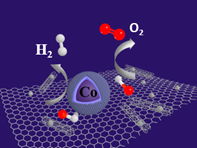Electrochemical splitting of water to produce hydrogen is one promising way for providing sustainable clean energy. The key to successfully realize this target is the development of highly efficient electrocatalysts for both oxygen evolution reaction (OER) and hydrogen evolution reaction (HER), which are comparable or even better performance than those of precious metal-based catalysts. Currently, it still remains challenging to develop efficient and low-cost bifunctional catalysts for both OER and HER.
In the study published in Adv. Funct. Mater, the team of inorganic synthetic chemistry led by Prof. ZHANG Jian reported a new nitrogen and boron co-doped bifunctional electrocatalyst (referred to as Co/NBC-900) by direct pyrolysis of cobalt boron imidazolate frameworks (BIF-82-Co) at 900 °C under N2 atmosphere for the first time.
Using boron imidazolate frameworks as precursor can guarantee the multiplex heteroatom doping sites distributed uniformly throughout the hybrid.
Importantly, the surface oxidation of metallic Co nanoparticles can be tuned by rational controlling the carbonization temperature due to the presence of the reducing activity of the rich B-H species, which contributes to optimizing the synergistic effect between these components.
As a result, Co/NBC-900 superior OER catalytic activity with a low overpotential of 302 mV at a current density of 10 mA cm-2, and high HER performance with an overpotential of 117 mV at a current density of 10 mA cm-2. When it acts as an overall water splitting catalyst, it reaches10 mA cm-2 at a cell voltage of 1.68 V with long-term stability.
This work paves a new way to develop highly active and non-noble metal-based catalysts.

Cobalt nanoparticles embedded in N, B-co-doped interconnected graphitic carbon and carbon nanotube (Co/NBC) is developed as efficient bifunctional electrocatalysts for overall water splitting(Image by Prof. ZHANG’s group)
Contact:
Prof. ZHANG Jian
Fujian Institute of Research on the Structure of Matter
Chinese Academy of Sciences
Email: zhj@fjirsm.ac.cn